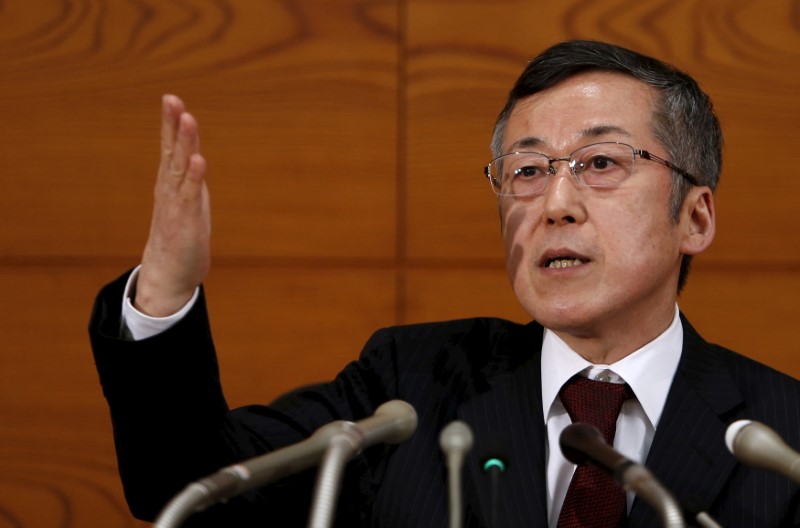 © Reuters. Bank of Japan board member Harada points at a reporter during news conference at the BOJ headquarters in Tokyo
© Reuters. Bank of Japan board member Harada points at a reporter during news conference at the BOJ headquarters in TokyoBy Leika Kihara
FUKUSHIMA, Japan (Reuters) – Bank of Japan board member Yutaka Harada said on Thursday the central bank had no reason to wind back its ultra-easy monetary policy as inflation remained well below its 2 percent target.
A vocal advocate of aggressive monetary easing, Harada defended the BOJ’s massive stimulus program, saying it was helping to reflate the economy and had kept the yen stable around 110 to the dollar.
“Since the introduction of quantitative and qualitative easing (QQE) and the 2 percent inflation target, the yen has moved in a range of 100-120 yen, and appears to be roughly stable at around 110 yen,” Harada said.
“I think this situation can be described as stable, taking into account the yen rose from 120 to 80 against the dollar around the time of the 2008 financial crisis.”
The BOJ should begin to withdraw stimulus only after confirming that price increases have gained enough momentum for achieving its target, Harada told business leaders in Fukushima, northeastern Japan.
“If the current monetary policy is maintained, labor shortages will intensify further as the economy improves, and there will be a phase in which both wages and prices increase,” he said. “If their momentum is strong enough, the BOJ will start reducing the level of monetary easing.”
The dollar stood around 112 yen on Thursday.
Harada brushed aside criticism made by some analysts that delays in rolling back stimulus could trigger hyper-inflation, destabilize the banking system and leave the BOJ without tools to fight another recession.
“Some people say that, because central banks in the United States and Europe are heading for the exit, Japan should follow suit,” Harada said.
“However, it makes perfect sense to me that Japan’s exit should come later than theirs” as inflation is still below 1 percent, he added.
The BOJ can avoid runaway inflation by tapering monetary easing or tightening policy when achievement of its price target is in sight, Harada said.
The central bank has not reached any decisions on an exit policy for its stimulus program, but possible steps that could be taken include abandoning negative interest rates, raising the interest applied to excess reserves financial institutions park at the BOJ or selling the BOJ’s holdings of government bonds, he said.
Harada is considered as among those in the nine-member board who emphasize the positive impact huge money printing could have on the economy and inflation, rather than the demerits of prolonged easing such as the hit to bank margins.
Still, he has voted with the majority of the board including at last year’s decision to shift to a policy framework targeting interest rates instead of the pace of money printing.
Fusion Media or anyone involved with Fusion Media will not accept any liability for loss or damage as a result of reliance on the information including data, quotes, charts and buy/sell signals contained within this website. Please be fully informed regarding the risks and costs associated with trading the financial markets, it is one of the riskiest investment forms possible.
Source: Investing.com



























